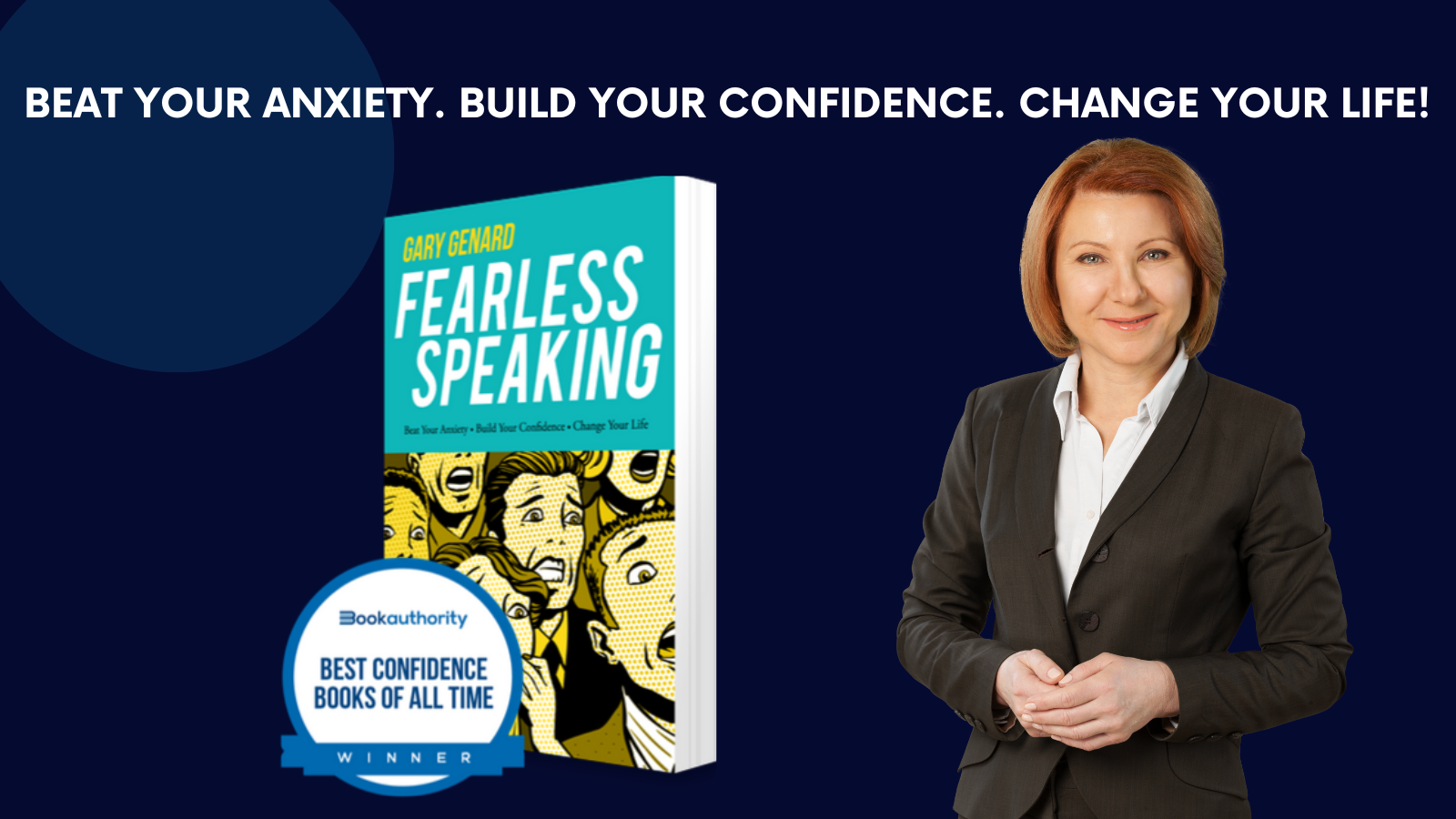Do you fear important speeches and presentations? Here's some great news. If you worry about public speaking, it should only be about THIS.
Let's face it: there are few things that engender more professional worry than succeeding in a make-or-break pitch, speech, or presentation.
The truth is, that one appearance you're getting anxious about isn't as important (in the context of your business and career) as you think it is. But let that go. Chances are, you DO worry about important presentations and meetings.
The problem is, you're worrying about the wrong things.
Does your worry lead to performance anxiety? Discover Fearless Speaking, the self-guided program with 50 practical ways to conquer stage fright. On Amazon or click below!
The good news is there's a way to restructure your thinking so you're on the right wavelength in terms of successful public speaking. Keep reading!
Part of the Problem: Your Glorious Brain
The glory of the human brain versus other mammals is our prefrontal cortex: the part of our brain that allows us to think and analyze in a way other mammals can't. This front part of the frontal lobe gives us the executive control that's vital for business decisions and gathering the data necessary to deliver findings to audiences.
When you speak in public, you're in the "oral arena." How do you learn performance skills? Download a Free Chapter of my Public Speaking Handbook: How To Give a Speech.
But running complicated programs and deciding on strategies isn't part of the performance dynamic employed in public speaking. Speaking to listeners is a simple task not a complicated one. In fact, one of our two biggest problems as professionals delivering presentations is that we remain stuck in our Big Brain, when it's time to leave the control panel and have a heart-to-heart talk with people. The other problem is focusing on how we're doing, instead of how the audience is doing.
Stage Presence Means Being Present!
As in any other endeavor, everything becomes easier when you stop overcomplicating things and develop the proper simplicity and focus. In terms of public speaking, that means countering the two bugaboos I mentioned above: an over-reliance on information delivery, and a crippling concern about how well you're performing.
Learn more about being a focused speaker. Download my Free cheat sheet, "Leadership Skills: 10 Focusing Techniques for Public Speaking." Be an exceptional communicator!
Just as in acting, a concern with giving a good performance will always doom you to delivering a bad one. Instead, you should be working toward the Holy Grail of public speaking: making a connection with listeners, and delivering your message in a way that will resonate with them. If you do those two things, then your talk will have a chance of succeeding. Succeeding in what terms? Simple: making listeners better off for having listened to you, and at best, making a difference in their lives.
Speakers only do that when they are present, meaning responding moment by moment to what's happening in the room or cyberspace. That's important, because things happen in speeches and presentations—and even contributions in meetings—that can never be predicted. The presenter who pays attention to an audience's reactions will change his or her approach when necessary, leading to an interaction that's much richer than any canned presentation. (Yes, this applies even in prepared speeches. What's wrong with off-the-cuff remarks, or sharing a story that just occurred to you based on what someone in the audience said?)
Here's more on being a more present and memorable speaker: my Free Guide, Six Rules of Effective Public Speaking. Add this resource to your speaking toolkit today!
Your Only Concern Should Be Your Audience
You can see from the above why there's only one legitimate concern (or worry) for you when you're delivering a speech: what's going on with the audience. The more experienced you become at public speaking, the more you'll be able, just like an actor, to get a sense of an audience's response and then respond accordingly yourself.
Simplicity is the ultimate sophistication. The moment you break your Big Brain fever, and stop stepping outside yourself to judge how you're doing, is the moment you occupy the right place at last. That's where you happen to be at that moment, having a simple conversation with people who share your interest in a topic. If you're knowledgable and have prepared sufficiently, your content will take care of itself.
Remember: your job is to give a speech. As in giving a gift. Your monumental data and self-regard have no role to play here. You do, though. You're the one. Thank goodness you're here!
You should follow me on Twitter here.

Gary Genard is an actor, author, and expert in public speaking and overcoming speaking fear. His company, The Genard Method offers live 1:1 Zoom executive coaching and corporate group training worldwide. In 2022 for the ninth consecutive year, Gary has been ranked by Global Gurus as One of the World’s Top 30 Communication Professionals. He is the author of the Amazon Best-Seller How to Give a Speech. His second book, Fearless Speaking, was named in 2019 as "One of the 100 Best Confidence Books of All Time." His handbook for presenting in video conferences, Speaking Virtually offers strategies and tools for developing virtual presence in online meetings. His latest book is Speak for Leadership: An Executive Speech Coach's Secrets for Developing Leadership Presence. Contact Gary here.
Anxious photo: TheDigitalArtist on Pixabay.




